Cry to Heaven Read online
Page 34
And she was at the school every time that he sang.
From time to time, he returned to the Contessa's with one purpose, though he never admitted to himself what it was. He would go to the chapel and look at those delicate and darkly colored murals, the oval-faced Virgin and her angels with their stiff wings, the muscular saints. It was always late when he did so; he had always just a little too much wine. And sometimes seeing her afterwards in the ballroom, he would stare at her so boldly and so long that surely her family was bound to take offense.
They never did.
But it was his life at the conservatorio that more fully engrossed him, and nothing really disturbed his regimen, his day-to-day happiness, except the long letters of his cousin Catrina, who in spite of the fact that he seldom if ever answered her, grew more and more bold.
Always delivered to him by the same young Venetian from the embassy, the letters were clearly meant for Tonio's eyes alone.
She, too, reported the birth of Marianna's second baby, saying simply it was healthy as the first:
But your brother's bastards far outnumber his legitimate heirs, or so I am told, as it seems not even his brilliant successes in the Senate and in the councils prevent him from an almost continuous delight in the fair sex.
Your mother he worships however, have no fear on her account.
Yet all marvel at his vigor, his robustness, his capacity for work and play from the crack of dawn to the chiming of midnight. And to those who express their admiration, he is quick to counter that exile and misfortune have both combined to make him savor the life he lives.
Of course at the mere mention of his brother, Tonio, he is at once driven to tears. Oh, how grateful he is to hear that you are doing so well in the south, and yet for all that gratitude, he is nevertheless concerned to hear so much about your singing and your prowess with the sword.
"The stage," he says to me, "you don't really think he would ever go on the stage?" And he confesses that he had fancied you somewhat of the temperament of your old teacher, Alessandro.
And I observe that you are more inclined to be another Caffarelli, and at that you should see the look on his face.
He would have everyone feel sorry for him! Can you imagine it! Don't I know what it means to him to be reminded so often, he says, of all this disgrace?
"And the dueling!" he says to me. "What of all this dueling? I only want for him to be at peace."
"Yes, and there is nothing so peaceful as the grave, is there?" I observe. Only to have him give way to great emotion again and leave my house in a flood of tears.
But he returns, soon enough, much fortified with wine, and pleasantly exhausted from the casinos. And bleary-eyed, he condemns me for my persecution, and yes, if I must know it, he has often thought it would have been better for his unfortunate brother, Tonio, if the surgeon had unwittingly caused some greater injury so that the boy were at rest.
"Why so?" I laugh. "What a dreadful thing to say. Why, he prospers remarkably by all accounts!"
"But what if he's slain in some foolish sword fight?" he demands. "I am never without worry over him night or day." He should never have sent you the swords you requested.
"Swords he can purchase anywhere," I remark.
"My little brother, my little brother," he says with such emotion it would wring tears from an audience. "Does anyone know what I have endured!" But then he turns from me as if he cannot confide in one so simpleminded and unsympathetic as myself the full extent of his various regrets!
But truly Tonio, I beg you to be careful and wise. If he hears more of your swordsmanship, he may well feel compelled to dispatch a pair of bravos to Naples for your protection. And I think you would find the company of such men confining, if not positively smothering. Tonio, be watchful and wise.
As for the stage, your voice, how can anyone begrudge you the gift God gave you? I hear your singing when I lie awake at night on my pillow. Would I could really hear it once again, and take you in my arms to show you how much I love you now as I have always. Your brother is a fool if he does not look to you to do great things.
This letter Tonio kept with him for a long time before he eventually committed it, as he had so many others, to the fire.
He was much amused by it, and strangely fascinated by it, and his hatred for Carlo was stoked by it to a new and hotter flame.
How well he saw his brother drinking of the cup of life that was Venice! How well he imagined that figure moving from the ballroom to the floor of the Senate, to the Ridotto, to a courtesan's arms.
But all Catrina's gentle warnings were lost on Tonio. He changed nothing in his own life.
He was as dedicated as ever in the fencing salon. And he perfected his aim with the pistol at targets when he had time for it. And alone in his room, increased his skill with the stiletto as much as anyone can without the luxury of sinking it regularly into other people's flesh.
But he knew it was not belligerence or courage that had prompted him to take such a commanding manner with Giacomo Lisani, or pushed him to such obvious skill with weapons just now.
It was simply that he could not conceal from anyone what he was in any way.
More and more the glances of those he met told him they knew he was a eunuch. And the glances of the young Neapolitans told him that he had won their unqualified respect.
As for the stage--his being another Caffarelli, as Catrina had so generously put it--he wished for it and dreaded it so much that sometimes he was baffled by his own mind.
He was intoxicated by the applause, the paint, the glitter of the beautiful sets, and the moment when he heard his own voice ring clear over the others, weaving its elusive and powerful magic for all who wished to hear.
Yet to think of the great theaters filled him with an isolating and strangely exciting fear.
"Two children in two years!"
Sometimes it hit him with such clarity and force that he stopped in his tracks. Two children, both of them healthy sons!
Many a Venetian family had only that claim upon immortality.
And he wished, oh, how he wished with all his heart, that his mother and his father had given him just a little time!
14
TONIO WAS WALKING in the Via di Toledo amid a swarming crowd at high noon when he realized that as of this day. May I, he had been in Naples exactly three years.
It seemed impossible. And then it seemed he'd been here all of his life, and had never known any other world.
He stopped, stranded for a moment, though the crowd was unwilling to let him stand still, and then turning around he looked up at the perfect blue sky and felt the breeze so gentle and so warm that it was like an embrace.
A little tavern opened nearby with a handful of tables outside on the cobblestones, the whole sheltered by a pair of old gnarled fig trees, and Tonio went there and ordered himself a bottle of Lagrima Christi, the Neapolitan white wine he'd come to love.
The leaves of the figs made huge hand-shaped shadows on the stones, and the warm air, caught here between narrow walls, seemed nevertheless to be always gently in motion.
In a minute he was drunk. It took no more than half a cup, and a spectacular happiness stole over him as he rested back against the rough little chair and watched the steady flow of those in the street. Naples had never seemed so beautiful to him. And despite all that he so disliked--the appalling poverty everywhere and the sheer idleness of the nobility--he felt himself a part of this place; he had come to understand it, on his own terms.
Maybe, too, anniversaries always evoked some celebratory feeling in him. In Venice there were so many and they were always festivals; it wasn't just the way to measure life; it was the way to live.
And after the morning's errands, this happiness was a quiet relief.
For hours he'd been imprisoned at the tailor's. He couldn't avoid the mirrors. And again and again the seamstresses reminded him of his increasing height. He was now six feet tall, and no one looking upon hi
m could any longer think him a boy.
The bloom to his skin, the fullness of his hair, the innocence of his expression; these only combined with the long limbs to make it known to all the world now what he was.
And there were moments when all the compliments he received angered him; and some thin memory of an old man in an attic room came back to him, a man denouncing a world in which all was measured by taste. It was taste that kept such a shape as his fashionable; it was taste that made women send him tributes and confessions of adoration, when all he ever saw in the mirror was the ghastly ruin of God's work. There was a horror to it, watching the scheme of creation so totally wrecked. He wondered sometimes if those who were gravely ill did not feel this--when they lost the feeling in their limbs, when some fever caused them to lose the hair on their heads. The gravely ill attracted him; freaks attracted him, the midgets and dwarfs he saw sometimes on the little stages about town, cripples, a pair of human beings linked together at the hip laughing and drinking wine as they occupied the same chair. These creatures magnetized him and tortured him; he counted himself one of them, secretly, beneath this magnificent disguise of brocade and lace.
He'd bought every fabric shown to him by the tailor; he'd bought a dozen handkerchiefs, cravats, gloves he didn't need.
"All the better to render you invisible, tall one," he'd whispered to the mirror.
Now as he felt this first delicious euphoria from the wine, that immediate alchemy of the spirits and the summer heat, he smiled. "You could be ugly as well, you know," he said to himself. "You could have lost your voice as Guido did. So let it be."
*
Yet the little torture chamber of the tailor's shop had put him in mind of his recent arguments with Guido and the Maestro di Cappella, arguments that were not likely to stop. Guido had been very disappointed when Tonio refused the prima donna role in the school's spring opera, stating again he would never appear in women's dress. The Maestro had again sought to punish Tonio by giving him a small role. But Tonio had showed no regret.
If anything had disturbed him about the spring opera, it was that his fair-haired friend was not there. For some time now she had not been in chapel either. Nor had he seen her at the Contessa's last ball. And this was disturbing him very much.
As for performing in female dress, his teachers weren't going to leave him alone. They did not share his conviction he could make a life for himself playing only men's parts. Centuries ago, the first castrati had been introduced to play women's parts; and though women performed everywhere now outside of the Papal States, the castrati were still famous for these roles. But with all major parts in the opera written for high voices, everyone had to be ready for anything, women often playing male leads, too.
Finally, the Maestro di Cappella had called Tonio in.
"You know as well as I do," he began, "that you need this experience before you leave here. And the time for your debut is almost at hand."
"But that's not possible," Tonio said. "I'm not ready--"
"Be quiet," said the Maestro. "I can judge your progress far better than you can judge it. And you know I'm right about this. I'm also right that you should perform out of the conservatorio, but you refuse this too. Invitations come in every week for you to perform in private houses, yet you refuse. Tonio, don't you realize this school has become a refuge for you?"
Tonio winced. "That's not so," he murmured with quiet anger, but he knew the Maestro was right.
"Tonio, when you first came here," said the Maestro, "when you first resigned yourself to sing, I didn't think you would endure. I thought the discipline would be much too harsh for you, and I steeled myself to see Guido disappointed again. But you surprised me. You became an aristocrat of this little place; you made it your Venice; you shone here as you might have there.
"But this isn't the world, Tonio, any more than Venice is the world. And you are ready for the world now."
After a long pause Tonio turned to meet the Maestro's gaze. "May I confide to you a little secret?" he asked. The Maestro nodded.
"Never in my life have I known the happiness I've known here."
The Maestro gave an affectionate and slightly sad smile.
"Does that surprise you?" Tonio asked.
"No," the Maestro said. "Not when one has a voice such as your voice, it does not." Then he bent across the desk. "That's your power, that's your strength. I promised you once that it would be if you let it. Now, it's nothing more than the truth. And now I'm going to tell you something else. Guido is ready for the world, too. He's ready to write your premiere opera for the Roman stage. He's patient with you because he cannot bear to see you suffer. So he waits. But you are both of you ready, and for Guido the work and the waiting have gone on for a long, long time."
Tonio didn't answer. He was not thinking. Rather he was merely aware that by now, in the normal course of events, he would have been a man. He would have looked and sounded like that double in Venice, and he was wishing vaguely that he could remember better the timbre of that manly voice. His own speaking voice by habit was soft, low, but he made it that way; and he never, never forgot himself, even when he laughed.
"I am going to be even more ruthless," said the Maestro. "There are others here ready to take the spotlight, ready to take your place."
Tonio nodded. But the man went on.
"Do you think I don't know what happened to you? From Guido year in and year out I've gotten only silence; from you, the same. But I know what happened to you, what you've endured...."
"You don't know," Tonio said sharply, "because it has never happened to you."
"You're wrong. True evil in this world is done by those with no imagination. I have imagination. I know what you lost."
Tonio didn't answer. He wouldn't admit to this. It struck him as proud and vain, but all the rest the Maestro had said was very simply true.
"Give me a little time...." Tonio said finally, more to himself than to the Maestro. And the Maestro, satisfied that he had been understood, had left it at that.
So now this was the third anniversary of the day he'd come.
And in the midst of this celebratory feeling, this gentle euphoria, he knew more clearly than ever that the Maestro was right.
It was almost dark when he returned to the conservatorio. He had gone first to the Albergo Inghilterra near the sea and let a couple of rooms. It was his plan to take Guido there tonight, and before that he wanted to stop into a nearby church to hear Caffarelli sing. Caffarelli had been in Naples over a year now, singing often at the San Carlos, but it meant something to Tonio to hear him on this special day.
Finding Guido's studio empty, he went into his room.
Guido was dressed already for the evening in a fine red velvet frock coat that Tonio had bought for him, and he was putting a jeweled ring on his left hand. His hair was neatly combed, the thick curls a glossy chocolate brown, and there was an unusual sheen to him altogether as he pulled on a new pair of white silk gloves. He wore his rhinestone buckle shoes.
"Ah, I've been asking for you all afternoon," he said. "I want you to come to the Contessa's house early," he said. "Have a light supper and don't drink any more wine. This is a special night, you must do as I tell you, and don't make any excuses, I know you don't want to come there, but you must."
"When have I not wanted to come there?" Tonio asked. Guido never looked so good to him as when he was going out.
"The last half a dozen times you've been invited," said Guido, "but you must come tonight."
"And why is that?" Tonio asked coldly. He could scarce believe the irony of all this. He was remembering Domenico's little plan of years before, the same albergo, rooms by the sea. He smiled. What could he say?
"The Contessa's been through an ordeal, and this is her first ball since she's been back. You know her cousin died, the old Sicilian who'd lived all those years in England. Well, she had to take him back to Palermo to be buried. I don't suppose you've ever witnessed a funeral in Pal
ermo."
"Never witnessed anything in Palermo," said Tonio.
Guido was shuffling through the bound scores on his desk. "Well, the old man had to be placed in a chair in the church for the ceremony, and afterwards mounted in the Capuchin catacombs with all the rest of the family; it's an underground necropolis, hundreds of corpses all properly dressed, some standing, others lying down, the lot tended by the monks."
Tonio winced. But he'd heard of these places. He could conceive of nothing like it in northern Italy.
"Yes, well, the Contessa has enough Sicilian blood that it didn't make much difference to her. But the old man's bride, the young girl from England he married, she was quite hysterical when she saw the catacombs. She had to be taken out."
"Small wonder."
"Anyway, the Contessa's back. She's done her duty, her cousin's buried, and this ball is rather important to her. So be there early as I ask."
"But what has this to do with me?"
"The Contessa likes you, she has always liked you," Guido said. "Now"--he put his arm around Tonio and held him tightly--"no more wine, as I said."
The house was dark when he reached it. He had left the church as soon as Caffarelli had sung his first aria, the castrato's music thrilling him and humbling him at the same time. Nothing of Venice had come back to plague him; he had heard Caffarelli too often since; and he'd been thirsty for that perfection, that lust in the voice, that understanding of a thousand things which he seldom found in others around him anymore.
He'd tried to let Caffarelli inflame him in a special way, too. He wanted Caffarelli, without ever knowing it, to give him some courage he lacked.
Whether that had happened or not he didn't know.
But it was pleasant to come into the Contessa's house early and have the luxury of seeing all this gilded plaster by the light of the moon. He gave up his cloak to the porter, said he didn't want anything yet, and wandered off alone through a chain of empty rooms. Simple furniture became spectral in the shadows, hovering above carpets full of half-realized illuminations, and the warm air pouring in was sweet. There was no smoke yet, no burning wax, and no French perfume.

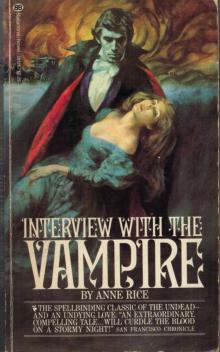 Interview with the Vampire
Interview with the Vampire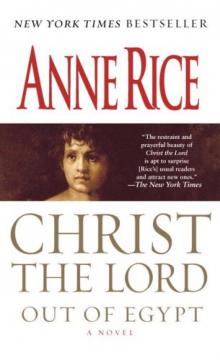 Christ the Lord: Out of Egypt
Christ the Lord: Out of Egypt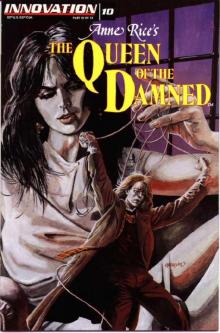 The Queen Of The Damned
The Queen Of The Damned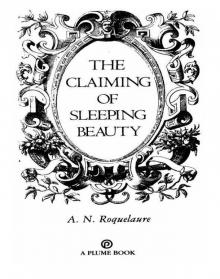 The Claiming of Sleeping Beauty
The Claiming of Sleeping Beauty Prince Lestat
Prince Lestat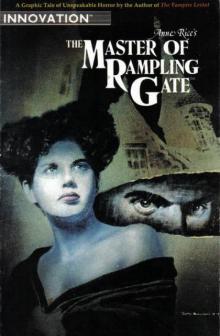 The Master of Rampling Gate
The Master of Rampling Gate The Vampire Lestat
The Vampire Lestat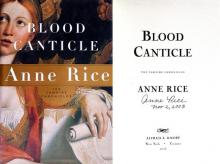 Blood Canticle
Blood Canticle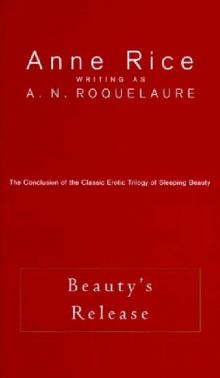 Beauty's Release
Beauty's Release Pandora
Pandora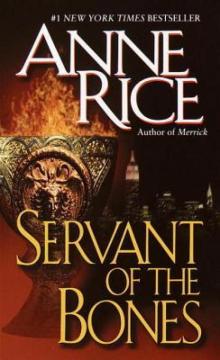 Servant of the Bones
Servant of the Bones Of Love and Evil
Of Love and Evil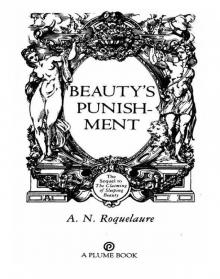 Beauty's Punishment
Beauty's Punishment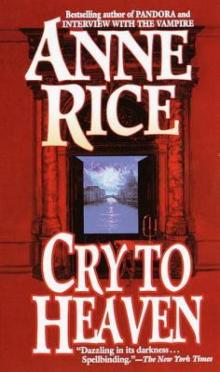 Cry to Heaven
Cry to Heaven The Tale of the Body Thief
The Tale of the Body Thief The Witching Hour
The Witching Hour Memnoch the Devil
Memnoch the Devil Blackwood Farm
Blackwood Farm Beauty's Kingdom
Beauty's Kingdom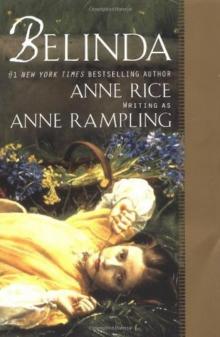 Belinda
Belinda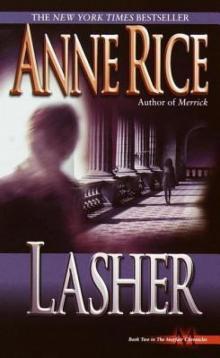 Lasher
Lasher Vittorio, the Vampire
Vittorio, the Vampire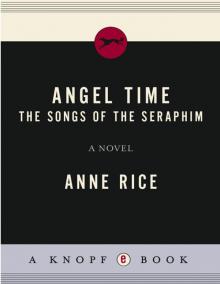 Angel Time
Angel Time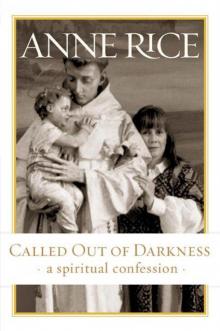 Called Out of Darkness: A Spiritual Confession
Called Out of Darkness: A Spiritual Confession Blood And Gold
Blood And Gold The Passion of Cleopatra
The Passion of Cleopatra Taltos
Taltos Exit to Eden
Exit to Eden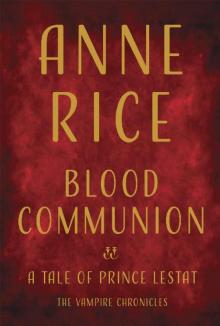 Blood Communion (The Vampire Chronicles #13)
Blood Communion (The Vampire Chronicles #13) The Wolf Gift
The Wolf Gift The Wolves of Midwinter
The Wolves of Midwinter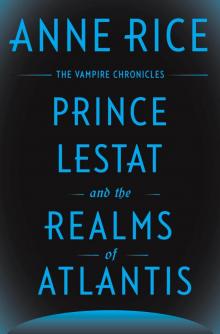 Prince Lestat and the Realms of Atlantis
Prince Lestat and the Realms of Atlantis The Ultimate Undead
The Ultimate Undead The Vampire Lestat tvc-2
The Vampire Lestat tvc-2 The Road to Cana
The Road to Cana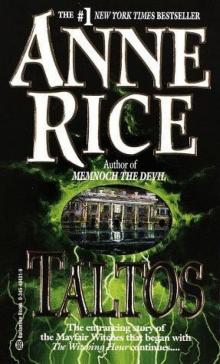 Taltos lotmw-3
Taltos lotmw-3 Merrick tvc-7
Merrick tvc-7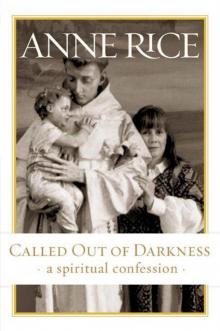 Called Out of Darkness
Called Out of Darkness Pandora - New Vampires 01
Pandora - New Vampires 01 Bllod and Gold
Bllod and Gold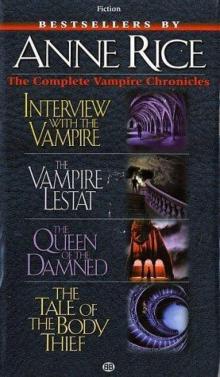 The Queen Of the Damned: Vampire Chronicles
The Queen Of the Damned: Vampire Chronicles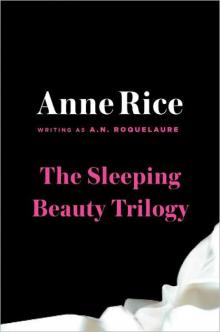 The Sleeping Beauty Trilogy
The Sleeping Beauty Trilogy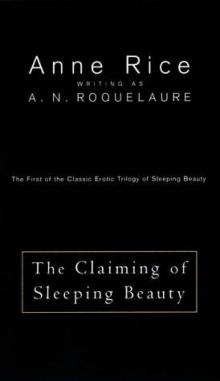 The Claiming of Sleeping Beauty b-1
The Claiming of Sleeping Beauty b-1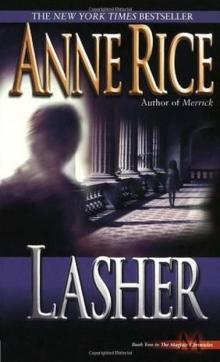 Lasher lotmw-2
Lasher lotmw-2 The Tale of the Body Thief tvc-4
The Tale of the Body Thief tvc-4 The Vampire Chronicles Collection
The Vampire Chronicles Collection Ramses the Damned
Ramses the Damned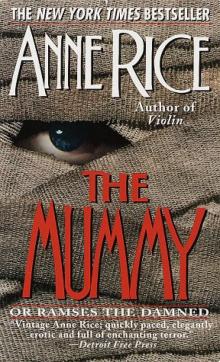 The Mummy - or Ramses the Damned
The Mummy - or Ramses the Damned Vittorio, The Vampire - New Vampires 02
Vittorio, The Vampire - New Vampires 02 The Vampire Armand tvc-6
The Vampire Armand tvc-6 Queen of the Damned tvc-3
Queen of the Damned tvc-3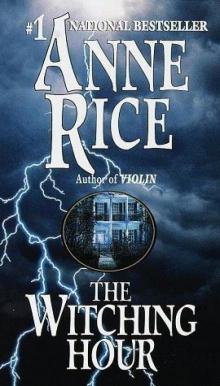 The witching hour lotmw-1
The witching hour lotmw-1 Feast of All Saints
Feast of All Saints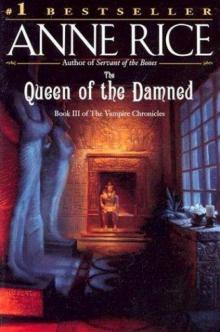 Queen of the Damned
Queen of the Damned The Wolves of Midwinter twgc-2
The Wolves of Midwinter twgc-2 The Mummy
The Mummy Blood and Gold tvc-8
Blood and Gold tvc-8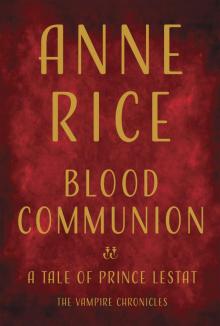 Blood Communion
Blood Communion Interview with the Vampire tvc-1
Interview with the Vampire tvc-1 Prince Lestat: The Vampire Chronicles
Prince Lestat: The Vampire Chronicles